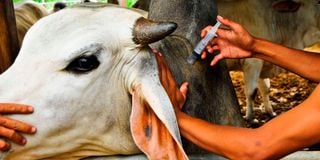Alarming surge in livestock diseases reported in counties

Cows being vaccinated against foot and mouth disease. Animals with the disease drool thin clear saliva, which foams at the lips and corners of the mouth.
What you need to know:
- President William Ruto has announced a national livestock vaccination campaign aimed at improving livestock health and supporting national and regional markets.
- However, some politicians have raised concerns about the government's vaccination plans, suggesting that the initiative could have unspecified ulterior motives
The National Drought Management Authority (NDMA) has reported an alarming increase in livestock diseases across several counties, even as the government prepares for a nationwide livestock vaccination drive.
The latest authority’s report highlights a troubling rise in disease outbreaks particularly in regions recently impacted by drought and other climate-related challenges.
In Turkana County, the spread of Lumpy Skin Disease (LSD) has been linked to cattle migration from South Sudan and Ethiopia.
The report also notes the presence of contagious bovine pleuropneumonia (CBPP), a highly infectious pneumonia in animals caused by mycoplasma mycoides.
The disease was reported in multiple wards, along with Tsetse fly infestations and tick-borne diseases like Anaplasmosis and Babesiosis, particularly in Turkana West.
Kwale County has seen outbreaks of Foot and Mouth Disease, CBPP and Newcastle Disease.
In Kajiado County, suspected cases of Pleuropneumonia, PPR (Peste des petits ruminants), East Coast Fever, Lumpy Skin Disease and sheep and goat pox have been reported.
West Pokot has reported a variety of livestock diseases, including suspected cases of Foot and Mouth Disease, LSD, CBPP, CCPP (Contagious Caprine Pleuropneumonia), PPR and Newcastle disease.
Baringo County has primarily seen endemic diseases such as CCPP, PPR, mange, and sheep and goat pox. Garissa County continues to deal with persistent challenges, including CBPP, CCPP, trypanosomiasis and hemorrhagic septicemia, which are particularly affecting small livestock and cattle.
In response to these growing concerns, President William Ruto announced a national livestock vaccination campaign last month aimed at improving livestock health and supporting national and regional markets.
The initiative targets 22 million cattle and 50 million goats and sheep across the country to alleviate the rising livestock disease burden, which is often exacerbated by recurring droughts in arid regions.
"We are set to embark on a national livestock vaccination drive to alleviate rising livestock diseases that are affecting pastoralists. This drive will help us to get healthy livestock in line with the national and international market demands," President Ruto stated.
However, some politicians have raised concerns about the government's vaccination plans, suggesting that the initiative could have unspecified ulterior motives.
But in response, the State Department of Livestock has dismissed these claims as "malicious and unfounded."
According to a statement from the Department, the mass vaccination programme, set for January next year, is vital for protecting animal health and ensuring a stable food supply.
"As global demand for animal products continues to rise, the health and well-being of livestock are of paramount importance. To ensure the health of animals and the safety of the food supply, the vaccination of livestock is one of the most effective and sustainable strategies available," said Director of Veterinary Services Obadia Njagi.
The ministry has also revealed that the vaccines will be supplied by the Kenya Vaccine Production Institute, which holds a Good Manufacturing Practice (certification.





